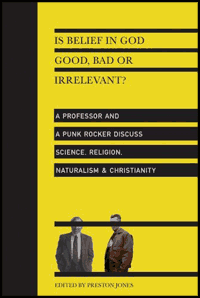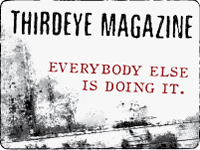
Whether it’s jazz, hip-hop, or rock, music is often born of the two headed beast of religion and politics. While in the hands of the much-maligned Bush Administration, the country has seen an explosion of politically fueled records. And given the influence of religion on today’s divided political landscape, it’s no surprise that many musicians have also been grappling with notions about God.
With over two decades in one of music’s most influential punk bands, Bad Religion frontman Greg Graffin has been one of the most outspoken voices on religion in society. Holding a master’s in geology from UCLA and a Ph.D. from Cornell University, Graffin will soon pack up the road gear from this year’s Warped Tour and head to UCLA where he teaches life science courses. After completing his dissertation, Graffin has continued a project (cornellevolutionproject.org) that examines leading evolutionary biologists and the degrees to which they believe in traditional religion and/or naturalism and the philosophical implications on their studies.
After examining several questionnaires, Graffin was surprised to find that while the majority of evolutionary biologists reject notions of traditional religion, they consider their personal beliefs in naturalism as something distinct from their studies. Were biologists acquiescing to a religion that, in America at least, embraces a virgin birth and resurrection from the dead? In actuality, the majority of biologists who responded to his survey seemed apathetic about the religiosity of evolution – many didn’t see any necessary conflict between science and religion. The majority agreed with the statement: “I keep my beliefs about morality and ethics separate from my practice and teaching of evolution.” Graffin was most put off by the political consequences of self-censorship. “They worry that the public association of evolution with atheism, or at least non-religion, will hurt evolutionary biology,” he said in a recent interview with Paste. Offended primarily by what he calls the “intellectual dishonesty” of compatibilism, Graffin contends that “there is no way to reconcile the two viewpoints, so quit trying to make them compatible when they’re not.” Graffin included interviews in his dissertation in which scientists asked whether it was their responsibility to re-educate society. Graffin’s response was pointed: If evolutionary biologists won’t do it, who will?
It’s this intense desire to uncover the inner workings of religion and modern society that drew Preston Jones, a Bad Religion fan and Christian professor at John Brown University, into correspondence with Graffin. Last year, a collection of email exchanges between the two was published, entitled Is Belief in God, Good, Bad or Irrelevant : A Professor and Punk Rocker Discuss Science, Religion, Naturalism & Christianity. When looking back at the intense months of their discussions, Professor Jones thinks fondly of the experience of learning about Graffin’s worldview, and vice versa. In a 2006 article in Christianity Today, Jones remembers the way their relationship changed his outlook on his faith: “In those months of dialogue I also saw the devastation wrought by the passion for pseudoscientific theories on natural history among some Christians. Many of my students believe that six-day creationism is an essential Christian belief – that if the first chapters of Genesis can’t be taken literally, then the whole Bible is a fraud. What tragic nonsense! Before Greg and I corresponded, I didn’t care. ‘You wanna believe the Earth was created six thousand years ago? Whatever.’ But Greg helped me see that this kind of gaping ignorance promotes the perception that theologically conservative Christians are the enemies of learning.”
A lack of cohesion definitely hurts the cause of organized religion. On this, both Jones and other proponents of religion within musical circles agree. But does this lack of cohesion displace the notion of God? Does it prove God irrelevant? After all, not all atheists agree with fellow atheists, and that doesn’t even delve into the larger agnostic demographic. Graffin’s concern with organized religion is that it misshapes and institutes destructive principles: “It’s dangerous to believe in something that has no reality, because then you can believe in anything just to save your own skin,” he says. “What would society look like without religion? It would look about what it looks like today, except there would be a lot less argument and fanaticism.”
“I think that people need to evaluate why they believe what they do and not just believe because it’s what someone told them to do.”
For Tim Lambesis, lead vocalist and founding member of As I Lay Dying, Christianity is scientific in that, for him, it operates more on reason and less on blind faith. Taking a two day break from their current Warped Tour stint alongside Bad Religion and hundreds of other bands, Lambesis spoke by phone from Oregon: “I see a lot of people that consider themselves religious who are driven entirely by emotion and the way they feel about God or whatever it is they worship. And I think that’s very poor reasoning, to love somebody or to worship somebody. I use the word ‘feel’, which is funny, because I’m talking about how feelings aren’t a good reason to do things…I think faith and reason are very [much] related. I think that people need to evaluate why they believe what they do and not just believe because it’s what someone told them to do. Believe because it’s what you’ve researched and found to be the absolute truth…for me, I believe in Christianity because I believe it’s the truth, but I think that truth itself is more important than the idea of religion or any sort of spirituality.”
But for Graffin, not only does organized religion fail to successfully align itself with natural science, the notion of faith has become corrupted. Contrary to many atheists, Graffin contends that the basic concept of faith is valid, but that the problem with organized religion is that it relies on an abstraction. “Faith in your partner, your fellow men, your friends, is very important,” explains Graffin, “because without it there’s no mutual component to your relationship, and relationships are important. So faith plays an important role, but faith in people you don’t know, faith in religious or political leaders or even people on stages, people who are popular in the public eye…you shouldn’t have faith in those people. You should listen to what they have to say and use it. It might give you some ideas on how to view the world, but ultimately you have to base your views on evidence.”
So where does this leave us? Doesn’t the implication that organized religion has no place in society mean that it doesn’t belong in music? And doesn’t this require the same sort of self-censorship among artists that Graffin has so adamantly opposed in his dissertation on evolutionary biologists? For Graffin, twenty years of Bad Religion albums hold less value than you’d expect. “I view music as entertainment,” he says. “When I’m on stage, I don’t look at that as a platform for sharing ideology. Otherwise I’d be a zealot myself. That’s why, when people ask me ‘Do you think you can change the world through your music?’ I say, ‘I doubt it.’” All those years of pointedly political and philosophical records seem to say otherwise; after all, it was a Bad Religion song that led Professor Jones to first email Graffin. In the end, the answer to whether God is good, bad, or irrelevant is a decision we must make for ourselves.





No Comments so far ↓
There are no comments yet...Kick things off by filling out the form below.